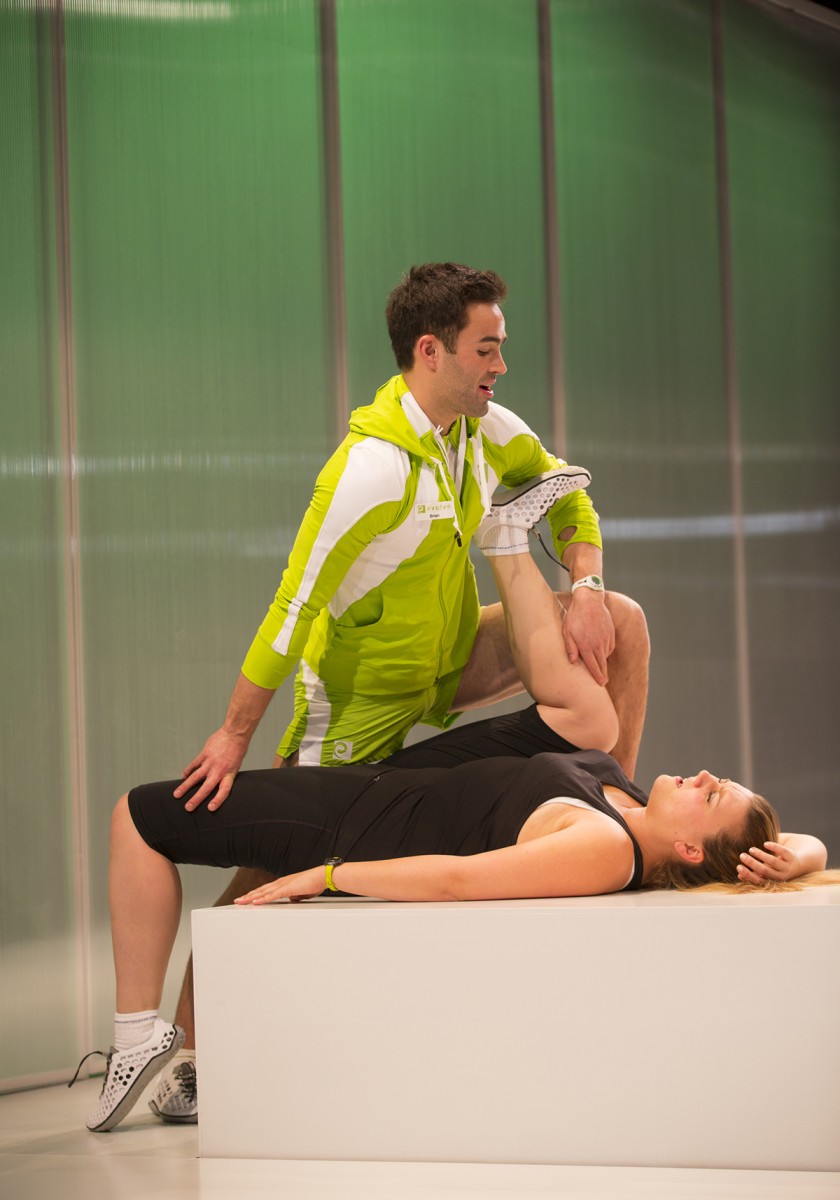When it comes to our looks, almost all of us have issues. Should we battle those issues and strive to overcome them, or should we work to alter our appearance? That’s one of the questions asked by Laura Jacqmin’s January Joiner: A Weight Loss Horror Comedy, playing at the Long Wharf Stage II, directed by Eric Ting. Set in a “fat farm” in Florida, the play focuses on three characters dealing with weight issues. Terry (Ashlie Atkinson) needs to lose weight for health reasons, and she’s adamant about doing so. Her sister Myrtle (Meredith Holzman) doesn’t feel her weight is an issue, and takes a more quizzical look at the weight-loss program. The only other enrollee in this off-period is Darnell, or Big D (Daniel Stewart Sherman), a “fat-proud” Minnesota native who comes back year after year “for the people.”

Staged against a long bank of frosted glass, terminating, at times, in a vending machine, January Joiner is streamlined in appearance and in its script. We get some backstory for each character—particularly in the story told by the main instructor, Brian (Anthony Bowden), that explains where he comes from and why he’s concerned about his body. Since most of us are concerned with our bodies in one way or another, the stories the characters tell about themselves carry an element of immediate identification.
The stand-out characterization in the play comes from Tonya Glanz as April, an uptight, relentlessly hyper instructor who has the hots for Brian—thwarted—and who seethes with righteousness about her super-trim—“svelte,” as she would have it—form. The play doesn’t really have a villain, but April is the character we’re not meant to sympathize with—and Glanz brings a brittle, boyish-girl quality to the role that helps with the humor at the character’s expense.
As Darnell, the character who is meant to evince the most sympathy, Sherman is good at giving us D’s forced brightness, a quality he has clearly learned so as to avoid whining, which would be much easier. We easily believe that the social interactions at Evolve are more important to him and his self-esteem than his weight is, and that’s why the tragedy that befalls him seems a bit unearned. The blow to the ego that he suffers is important because it works with the play’s theme that improving our appearances doesn’t necessarily improve us, but it’s hard to believe he would take it so hard.
The key character for the “tragic” aspect of the play is Terry. Played initially by Atkinson, Terry is likeable, easy-going and giggly; in the second half of the play, after she starts to see results, she is played by Maria-Christina Oliveras. But the fact that the character Oliveras plays is called “Not-Terry” immediately lets us in on the dynamic involved. Not-Terry is driven, impatient and cutting. As she “cuts away the fat”—to use the terms April exhorts them with—she also cuts away a lot of her empathy for others and her willingness to see someone like Darnell as a potential boyfriend.
The linchpin of the plot is Myrtle. She’s the one who initially is troubled by the demonic vending machine and its ominous tendencies, and she is the one for whom Brian, very unprofessionally—in a good comic sequence—develops “hard feelings,” so to speak. We could be watching a story of true love in weight loss, where only the one not concerned with her body finds love, but Jacqmin’s plot is a little more complicated than that. Terry, or rather Not-Terry, has her own designs on Brian, and maybe the sister with the more “svelte” body that will get the guy.
If this sounds like it’s adding up to an einy-meiny-miny-moe for Brian—or maybe it’s a judgment of Paris—choosing amongst thin (April), heavier (Not-Terry) and heaviest (Myrtle), that’s because it is. So when Darnell shows up at one point with wings, we might be meant to think more of Cupid than an angel. Which is to say the romantic aspects of the play override both its comedy and horror elements, though both are certainly present.
One of the more jarring aspects of the show is the use of the vending machine: it seems to represent all that is fraught with guilt and unease about the process of dieting, but it also has a homicidal side that matches to the idea that “improving” oneself also means “doing away with” an earlier self. That theme is what keeps January Joiner interesting. What keeps it amusing is its ability to show us the attitudes we have about weight and make us laugh at them. The cast, both thin and plus-sized, is very game in that regard, having to do sit-ups—there’s one very funny sequence with Myrtle spotting for Darnell—and work out as well as cavort about in revealing costumes.
There are good effects throughout, via Set (Narelle Sissons), Lighting (Stephen Strawbridge) and Sound (Leah Gelpe)—the scary machine, and the suggestion of a swimming pool, and the beds/counters that rise from the floor. Some of the dramatic elements don’t fully jell—for all the fun of the evil vending machine, its contribution has little to do with the plot—but what keeps the play appealing is its appeal to situations we can readily recognize. Somewhere between Darnell’s fatalistic “it’s all in the genes” and Not-Terry’s steely efforts to cut away, through will power, the part of her she doesn’t want is where most of us reside, trying to look better without necessarily also trying to be better. January Joiner weighs in on the importance of the latter over the former.
January Joiner A Weight Loss Horror Comedy By Laura Jacqmin Directed by Eric Ting
Set Design: Narelle Sissons; Costume Design: Oana Botez; Lighting Design: Stephen Strawbridge; Sound Design: Leah Gelpe; Casting: James Calleri, CSA; Production Stage Manager: Matthew Melchiorre
Long Wharf Theatre January 9-February 10, 2013


